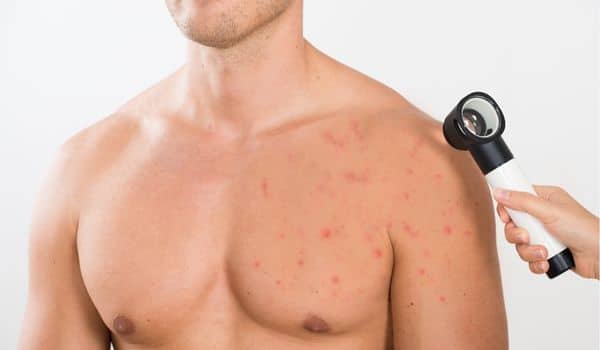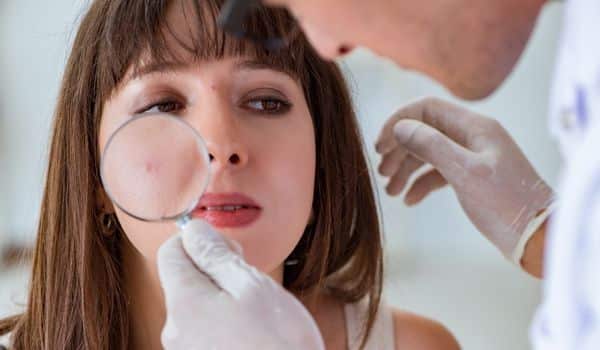What Is the Best Time to Get a Skin Cancer Check? – Benefits of Winter Skin Cancer Check
Changes in your skin happen as you get older. Some skin changes are a result of ageing and others a result of accumulated skin damage due to sun exposure or lifestyle choices. Winter is a great time for a skin cancer check-up.
Dr Mark Gittos FRACS(Plast) is a specialist plastic surgeon who offers removal procedures of any skin lesions or other unsightly changes at the level of the skin. While you could do a skin cancer check yourself, it might be better to have an expert in skin cancer and melanoma check for you.
What Is Skin Cancer?
Skin cancer is a type of cancer that can affect anyone. It is more common in people of old age or people who spend a lot of time in the sun, although other skin cancer risk factors are not excluded. Skin cancer or melanoma is a type of cancer that occurs when skin cells that produce melanin start growing uncontrollably.
Watch Dr Mark Gittos explain Melanoma Treatment
Benefits of a Winter Skin Cancer Check
Your doctor or skin check professional can assess your case and skin condition to determine the scope and the nature of the changes. They will ask you questions about your health, medical history, family medical history, lifestyle choices and habits. They will then proceed to inspect your skin to identify any changes.
If the doctor sees any changes, he will inspect them in detail and proceed to check the skin in other areas of your body in search of any additional changes. If the doctor thinks it is necessary, he can also take a small sample of the change to send for a biopsy. In some cases, if the biopsy shows that this was a case of a skin cancer change, your doctor may order some additional screening, such as a CT scan or an MRI, to see if the change has spread deeper into the tissues of your body.
Why is winter the best time to get a skin cancer check? Well, in winter, the skin has had enough time to get back to the usual level of pigmentation after the sun exposure that occurred during summer.Any changes, such as melanoma, will be more pronounced and easier to identify. If you have a skin cancer check during summer, the tan might mask some of the changes or make them more difficult to spot.
Early Skin Cancer Treatment
Skin Cancer is best treated when discovered early. Melanoma is the most dangerous type of skin cancer, but it can still be treated in over 95% of cases and an early discovery yields success rates of around 99%. If the skin cancer has progressed into deeper tissues, the recovery chances get slimmer, while in cases with metastasis, they may be significantly reduced.
The best practice with skin cancer changes is regular skin checks and protection from UV rays. You may search for a skin cancer check dermatologist who can check your skin periodically, or you may schedule an appointment with a specialist plastic surgeon who will be performing the skin cancer surgery, if required. Dr Mark Gittos suggests that skin cancer skin checks should be done yearly and that you do self-checks at home at least once every three months.
Why Is Skin Cancer Check Important?
The importance of skin cancer checks cannot be overestimated. Winter skin cancer checkup can offer more benefits than the same checkup procedure done during summer. This is so because you lose the tan during winter, and any changes on the skin can be seen more easily. Strong skin pigmentation is characteristic of melanomas, a common type of skin cancer.
Skin Cancer Check FAQs

How do I know if I need a skin check?
- Everybody needs an occasional skin check-up. If you are above 30, have a history of prolonged exposure to the sun, have been paying visits to a tanning salon or have had a history of skin cancer in your family, you may want to schedule a check-up with Dr Mark Gittos.
Can skin cancer appear in winter?
- Skin cancer can appear any time and anywhere on the body. Wintertime is associated with lower temperatures, but UV radiation can still be quite strong. Although several layers of clothes protect your skin during winter, melanomas and other types of skin cancer can appear, especially as a result of long-term damage to your skin.
What does a melanoma spot look like?
- A melanoma spot can be of a range of colours, shapes and sizes. The colour of a melanoma change can range anywhere from white over red to black. The form is asymmetrical, and the size is slowly increasing. Sometimes, you may notice oozing or bleeding from the melanoma spot.
How can you tell if a spot is skin cancer?
- Some criteria may suggest a skin change is skin cancer. They follow as ABCDE:
- A – Asymmetry. Most melanomas are asymmetrical
- B – Border. Borders of melanoma are not clear lines; they are not round or oval as moles are
- C – Color. Moles are of one colour. Melanomas can range anywhere between white, over red, to almost completely black, and they may have more than one colour
- D – Diameter / Darkness. Melanomas grow, so if you notice a growing mole, you should head to your doctor
- E – Evolving. Skin cancer changes in size (it evolves, in a way)
What are the months when sun is the strongest?
- The sun is generally the strongest during the summer months, with December and January being the months with the highest UV radiation index. The same index is high in February, but it may be slightly less risky than December and January due to a shorter daytime. In general, there is no safe time to be outside without SPF. Even at the peak of winter, UV radiation is present and is especially strong on the mountains and at the seaside. In the mountains, snow cover reflects most of the UV radiation that falls on it; therefore, it amplifies the UV radiation. Increased elevation also means a shorter air column that should block the UVA and UVB rays. At the seaside, the water reflects UV radiation into the air. In contrast, if you happen to be diving, the small ripples on the water surface (the same that give that pattern-like appearance to sandy bottoms) focus harmful sun rays and increase the damage done to the skin.
How strong is UV in winter?
- UV radiation index can be very high during winter, especially if a snow cover is present. Snow reflects the harmful UVA and UVB rays and does more damage to your skin. If you visit a ski resort, the damage can be even greater since higher altitudes mean strong UV radiation.
Is there less UV light in winter?

- Yes and no. UV radiation falls on the surface at a higher angle during wintertime and may result in an APPARENT reduction of UV radiation. However, a large portion of these rays gets reflected from snow, so that you get two weaker sources of UV radiation that your skin is exposed to.
Why is the winter sun bad for you?
- The winter sun still emits high quantities of UV radiation which can damage your skin equally during winter as it can during summer.
When should I get a skin check?
- The best time to get a skin check is in the winter. This does not apply if you use indoor tanning regularly.
When should you start getting skin checks?
- There is no minimum age requirement for a skin check or even a full-body skin cancer screening. The sun does as much damage at a young age as it does in old age. The elderly are more frequently advised to have a specialist plastic surgeon do a skin cancer check-up because the damage from the sun is cumulative. Therefore, skin cancer and related skin changes are more common in old age.
How often should you have a skin check?
- According to Dr Mark Gittos, you should have a skin check annually. When you are younger, you may go for a skin check every few years. The recommendation is also to do self-checks at home every three months.
Can you get a skin check with a fake tan?
- Fake tan changes the skin complexion and makes it more difficult for your specialist plastic surgeon or a dermatologist to spot any changes on the skin. So, if you are planning on getting a fake tan, make sure to schedule your check-up first and then get the tan. If you have had a tanning session already, wait for a couple of weeks before you plan a check-up with your doctor.
Can you get a skin check when pregnant?
- Yes, you can get a skin check when pregnant. If your skin is dry during pregnancy or overly stretched due to the baby belly, you may want to apply moisturiser daily for at least a week before the check-up. Dry skin makes it harder to notice any changes on the skin, and the photographs that your doctor may take for comparison later on, may not be as sharp and truthful.
Do you need a referral for a skin check?
- You may ask your doctor for a referral, but you may also schedule a visit to a specialist plastic surgeon by yourself. Procedures for skin cancer removal are considered a medical necessity, so your expenses will usually be covered if you have healthcare insurance. If not, there are finance and funding options. Dr Mark Gittos and his team will be able to give you more information.
What happens if something suspicious is found during my skin check?

- If anything suspicious is found, Dr Mark Gittos will examine the change and, if necessary, take a sample to investigate under a microscope. If the change is skin cancer, you will be instructed into different procedures that are the best for your case. Upon agreeing on the skin cancer removal procedure, you will schedule the date that suits you the best.
Is it normal that moles change in pregnancy?
- Yes. Almost 10% of pregnant women report changes in their moles during pregnancy. The changes may be due to skin stretching, an increase in weight as well as hormonal changes. If any large-scale changes occur and if the moles become of irregular shape, make sure to schedule an Mole check or removal appointment with Dr Mark Gittos to examine the changes.
What is a full skin check?
- A full skin check is a check-up procedure during which the entire body’s skin is examined for any changes that may be skin cancer.
Should everyone get a skin check?
- Yes. Everyone should get a skin check, regardless of their age. The older you are, the more important regular skin checkups become, and Dr Mark Gittos suggests having annual checkups.
What can I expect from a full-body skin test?
- A full-body skin test is a check-up procedure that examines the skin of your entire body in search of skin cancer. At the end of this test, you may expect Dr Mark Gittos’ detailed explanation of your skin condition and health, opinion on any changes and a precise diagnosis if the changes are cancerous. You will also be instructed on proper skincare and when your next check-up should be.
What should I wear for a skin check?
- You should wear loose, comfortable clothes for your skin check. The clothes should be easy to put on and take off since you will be given a medical gown to wear during the skin check.
How do you prepare for a skin check?
- Keeping your skin well-moistured before the procedure is the key to a successful sin check. You may want to wear plain underwear if your surgeon has recommended full skin mapping.
How long does a skin check take?
- Skin check may take up to 30 minutes. This includes both the examination of your skin as well as an informative talk with Dr Mark Gittos.
How long does the melanoma or skin cancer procedure take?

- The skin cancer removal procedure can take anywhere from one hour to several hours, depending on your case. In general, early detection means that the area to be cleared of cancer is small. This significantly decreases the time needed for the procedure.
How can I prevent melanoma?
- You can prevent melanoma by wearing clothes that cover your skin even during the summer months. Another layer of protection is the SPF, with at least a 30+ protection factor. You can protect your eyes and the skin around them by using sunglasses.
Do I need to use sunscreen?
- Yes using Suncreen can help prevent skin cancer. You may want to start applying sunscreen from 6 months of age. Reapply the sunscreen every two hours of sun exposure, as well as after swimming and excessive sweating.
Further Reading about Skin Cancer
- Skin Cancer Removal Procedures
- Sun Protection Tips for Reducing Your Skin Cancer Risk
- Types of Skin Cancers and Their Causes
Medical References
- Skin Cancer Checks in Winter – Providence Medical
- Specialist Australia: Skin Cancer in Winter: When and how to protect yourself
- Stanford Healthcare: Skin Cancer Prevention Also Important in Winter
Organise a Skin Cancer Checkup
If you haven’t had a skin cancer check-up in a long time and you like to spend your free time outside in the sun, now may be the right time to schedule your next skin check-up. Dr Mark Gittos is a specialist plastic surgeon who offers skin check-up and skin cancer removal services. This seasoned professional will be able to assess your case, examine your skin and provide the best care for you as his patient. Dr Mark Gittos is known for very natural-looking results and comfortable post-op recovery.
About Dr Mark Gittos FRACS (Plast) – New Zealand Plastic Surgeon
Practice locations in Herne Bay Auckland, Northland and Bay of Plenty – Kerikeri, Whangarei, New Plymouth & Tauranga
Dr Mark Gittos is a leading Specialist Plastic Surgeon and operates a practice in Herne Bay, Auckland and in the UK. The practice focuses on both surgical and non-surgical procedures, each designed to help restore, improve or change a physical characteristic or problem. The first step in every case is to talk through your personal requirements and explore all the options, before deciding on the most effective solution.
Dr Mark Gittos offers high quality, natural-looking cosmetic surgery results and is highly experienced in Breast, Body and Face Surgery having performed over 4000 Surgeries in the last 26 years. With worldwide expertise Dr Gittos is an expert in breast, face and body surgery for men & women.
Naturally, before any treatment is begun, we will explain clearly the advantages and risk factors; so that you have the information you need to make an informed decision that is best for you. Visit the practice to find out more.

NEXT STEPS
Please NOTE: Dr Gittos only performs surgery on non-smoker patients with a BMI less than 30. To check your BMI please visit the NZ Heart Foundation website. For help giving up smoking before surgery visit the Smoke Free website
Do your Research
- Read the Website and Blogs relevant to your procedure
- Browse our Frequently Asked Questions including how to choose a Surgeon for your procedure
- Download and read the FREE Guides to Surgery
What to Bring to your Plastic Surgeon Consultation
- Bring a friend or relative to help discuss the information and your choices
- Take lots of notes and read the documents provided thoroughly
- Dress in simple clothes as you may need to undress for examination
- Bring your medical referral and any relevant medical documents or test results
Book your Initial Surgery Consultation
- A Referral from your GP or specialist is helpful but NOT essential – you can have a consultation without a GP Referral
- Email us or Call on 09 529 5352 to arrange your surgeon consultation appointment.
- Book a consultation with Dr Gittos by paying the Consultation Fee – $350 incl GST
Traveling for Surgery? – Consider post-surgery luxury recovery in a Hotel with LuxeCare
Please contact us to arrange to book a consultation with our Specialist Plastic Surgeon or to speak with our Patient Care Advisor.
Send an enquiry form today or phone 09 529 5352 during Clinic Hours
